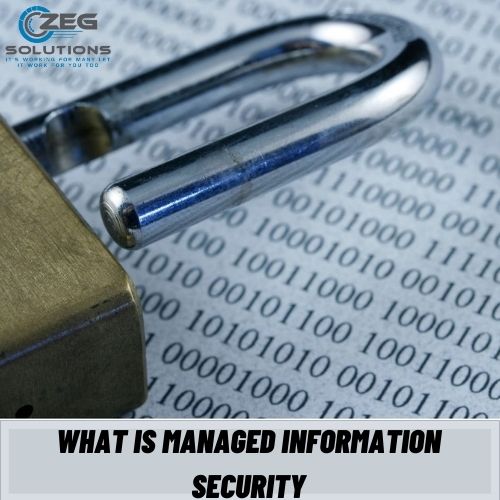The protection of confidential information is a business requirement and, in many cases, a moral and legal requirement because organizations store all kinds of information about their customers that should not be shared with others under any circumstances.
Suppose confidential information about a customer or the institution’s finances or new product is leaked to a competitor. In that case, this information leak may result in financial losses to the business, legal action or even bankruptcy.
The use of managed information security services has grown significantly in recent years. Join us to learn about managed intelligence services and their benefits.
Managed information security
In a global, mobile community, information can travel from region A to B in seconds. As the recent data scandals of Facebook and various companies are heard, hacker attacks also expose information to constant dangers. Today, the need for the security and protection of data is increasing. Fortunately, some companies provide this information security to you on an ongoing basis. With the latest technology, they take responsibility for monitoring your data protection. But what exactly is information security?
What does information security mean?
Information security means protecting information and information systems because various damages can be done to companies’ information such as access, use, disclosure, reading, copying or recording, corrupting, altering, jamming and malware.
In general, information security refers to protecting information against risk or manipulation and the resulting serious economic damage. First of all, unauthorized access to data or its unauthorized decryption by third parties must be prevented.
Information security is concerned with the confidentiality, integrity, and availability of data.
Computer security focuses on ensuring the computer system’s availability and proper operation without worrying about the computer system’s information stored or processed.
Goals of information security:
The term “information security” defines all actions in technical and non-technical systems that ensure the objectives of privacy protection, availability and integration, and loss prevention.
1-Confidentiality of information
Only authorized users can access the information intended for them to read, process or edit.
In terms of confidentiality, data can only be viewed and managed by authorized users.
2-Information integrity
This means that unseen changes by unauthorized people are not possible and are prevented.
Integration is to prevent data alteration and manipulation.
3-Availability of information
It prevents system failure, and it is always possible to use them.
Availability prevents system failure.
The goals of further information security are authenticity and responsibility. It Describes the authenticity, accuracy and verifiability of the data. This commitment ensures that any access to the data is traceable. Appropriate measures must be taken in each company to achieve security objectives and ensure information security.
Importance of information security
Business and trade secrets such as manufacturing processes, technical knowledge, and customer information or price are the basis of many companies today. Protecting them is an essential task for companies. On the one hand, it protects against data loss. On the other hand, data misuse such as data theft has been considered for several years. For these reasons, protecting your company’s confidential information is critical to protecting your company from financial damage.
Events that harm information security
Information security refers to all actions that are taken to combat malicious operations. Expert studies show that fraudsters try to destroy or steal information in a variety of ways. Knowing these ways will help companies and individuals make the necessary plans to secure their system. The following are the events that can damage the system’s security, along with the possibility of their occurrence.
- 10% of malware or fraudsters infiltrate web pages
- 40% possibility of system hacking
- Loss of necessary equipment such as laptops or other similar devices on which essential information is stored 10%
- Theft of important information and data 10%
- Theft of a computer or other equipment on which information may be held 10%
- Unknown or unpredictable factors 10%
- System failure System failure.
Having security holes in an organization can have several negative consequences for an organization:
- Reduce revenue and increase costs
- Damage to the reputation and reputation of an organization
- Loss of essential data and information
- Disruption in the current processes of an organization
- Legal consequences due to the lack of a security system and a negative side effect on the activities of other organizations
- Loss of customer trust
- Losing investor confidence
Managed security services
MSSP service providers offer a variety of services to their customers. One of them is ordered security services.
These services are responsible for protecting customer information and save the company’s data against cyberattacks, malware and information system disruption.
These services may be provided within the company or provided remotely to customers.
Tasks and functions of managed security systems
1. the essential functions include monitoring and controlling systems and information around the clock, responding and acting quickly in critical situations, and maintaining information and access management by particular individuals.
2. Because they are regularly updated, they are a strong shield against all kinds of problems in the information system.
3. These services save their customers from spending a lot of money to monitor and protect information.
4. Services are simplified, and information is integrated.
5. Information is always available.
6. Also, there is no need for a large number of experts to protect information.
7. The need for special equipment and places and software and the concern of damage to information are eliminated.
8. As a result, companies spend all their energy on developing their business.
9. Since these services are provided around the clock, healthy, and always active support emerges for these services’ users.
10. These services quickly detect system failure and immediately solve the problem with their expertise.
11. They also back up the data and prevent it from being destroyed by various events.
12. Therefore, the design, development, implementation, and management of these information systems is the providers’ responsibility.
The location of these services
Due to the valuable services that these services offer, their customers’ number is increasing day by day. Interestingly, the contributions of information technology companies, other companies are also more interested in outsourcing IT security.
Benefits of investing in managed security services
Businesses and organizations will benefit from the following benefits by implementing a security strategy:
• Reduce the likelihood of systems and applications being disabled (missed opportunities)
• Effective use of human and non-human resources in an organization (increasing productivity)
• Reduce the cost of data loss by malicious viruses or security holes (protection of valuable data)
• Increase the safety of the intellectual property.
Content result
By using these managed services, companies, businesses, and various organizations reduce their responsibilities and concerns regarding protecting information and secrets of companies and customers. They protect information quickly and with the latest tools. Also, they attract customer satisfaction, give them more credibility, and protect themselves from the consequences of damaging information.



